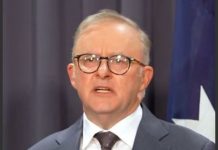
Nov. 16 (UPI) — Following nearly a decade of negotiations, the leaders of 15 Asia-Pacific nations have signed the world’s largest trade agreement they say will aid their recovery from the coronavirus pandemic.
The Regional Comprehensive Economic Partnership Agreement was signed virtually on the sidelines of the Association of Southeast Asian Nations annual summit in Vietnam on Sunday, creating a trading bloc involving the 10 ASEAN members and Australia, China, Japan, South Korea and New Zealand.
A summary of the deal describes it as “a modern, comprehensive, high-quality and mutually beneficial economic partnership” that aims to expand regional trade and investment while contributing to economic growth and development, especially as the signatory countries deal with the economic realities of the coronavirus pandemic.
“In light of the adverse impact of the pandemic on our economies, and our people’s livelihood and well-being, the signing of the RCEP Agreement demonstrates our strong commitment to supporting economic recovery, inclusive development, job creation and strengthening regional supply chains as well as our support for an open, inclusive rules-based trade and investment agreement,” the leaders said Sunday in a joint statement, saying the deal will be “critical” to the region’s response to the pandemic.
The agreement encompasses about 30% of the world’s gross domestic product and population. According to estimates from the Washington, D.C.-based think tank Peterson Institute for International Economics, the deal projects to add $186 billion to the global economy.
“RCEP will give a much-needed boost for a swift and robust recovery for businesses and peoples in our region, particularly during the current COVID-19 pandemic crisis,” Dato Lim Jock Hoi, the secretary-general of ASEAN, said in a statement.
China called the agreement a “victory of multilateralism and free trade” that will advance COVID-19 recovery efforts.
“After eight years of negotiations, the signing of the RCEP shines light and hope through dark clouds under the current international situation, showing that multilateralism and free trade are the right way forward, and remain the right direction for promoting the growth of the world economy and the progress of humanity,” Chinese Premier Li Keqiang said on Sunday, state-run Xinhua reported.
The deal is expected to eliminate tariffs and quotas for more than 65% of goods while reducing red tape and implementing region-wide rules and regulations to encourage firms to invest in the region, according to ASEAN.
New Zealand said it expects its GDP to grow by around $2 billion because of the deal.
“As party to the RCEP, New Zealand has a seat at the table of this globally significant regional economic agreement, providing the opportunity to cooperate on a broad range of economic and emerging issues,” Damien O’Connor, the Oceania country’s minister for trade and export growth, said in a statement. “It shores up support for international trade rules, which small countries like New Zealand rely on, at a time when we’re seeing increasing protectionism.”
Scott Morrison, the prime minister of Australia, applauded the deal for its potential to “open up new doors” for the country’s farmers, businesses and investors.
“With one in five Australian jobs reliant on trade, the RCEP Agreement will be crucial as Australia and the region begin to rebuild from the COVID-19 pandemic,” he said in a statement.
The agreement would have covered a substantially larger percentage of the world’s population if India had signed, but it withdrew from negotiations in November 2019. The agreement, however, includes a “fast-track accession process” should India wish to rejoin, according to an overview of the agreement provided by New Zealand.
The signatory countries said in a statement that they would “welcome” India into the deal.
Brunei, Cambodia, Indonesia, Laos, Malaysia, Myanmar, Philippines, Singapore, Thailand and Vietnam are the 10 ASEAN partners of the deal.






